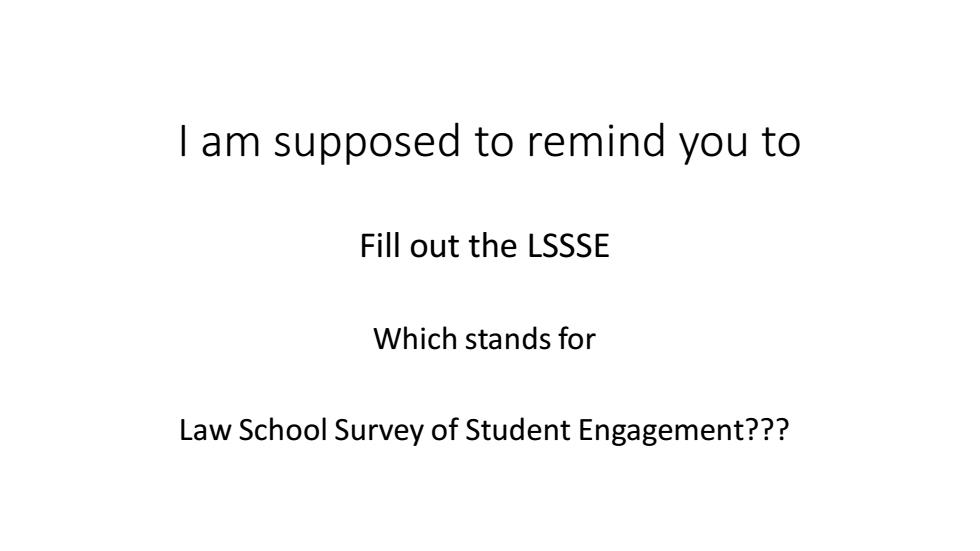
I am supposed to remind you to Fill out the LSSSE Which stands for Law School Survey of Student Engagement???
I am supposed to remind you to Fill out the LSSSE Which stands for Law School Survey of Student Engagement???
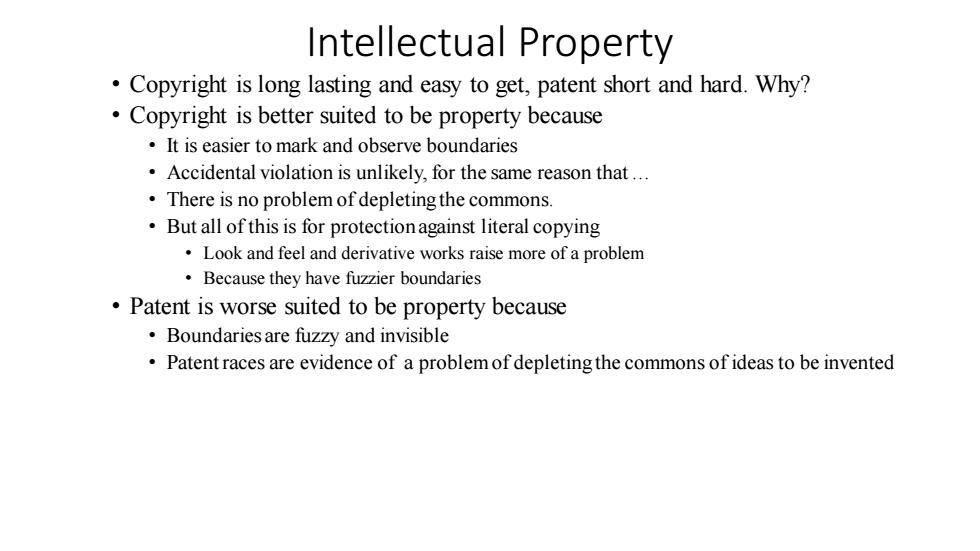
Intellectual Property Copyright is long lasting and easy to get,patent short and hard.Why? Copyright is better suited to be property because It is easier to mark and observe boundaries Accidental violation is unlikely,for the same reason that... There is no problem of depleting the commons. But all of this is for protectionagainst literal copying Look and feel and derivative works raise more of a problem Because they have fuzzier boundaries Patent is worse suited to be property because Boundaries are fuzzy and invisible Patent races are evidence of a problem of depleting the commons of ideas to be invented
Intellectual Property • Copyright is long lasting and easy to get, patent short and hard. Why? • Copyright is better suited to be property because • It is easier to mark and observe boundaries • Accidental violation is unlikely, for the same reason that … • There is no problem of depleting the commons. • But all of this is for protection against literal copying • Look and feel and derivative works raise more of a problem • Because they have fuzzier boundaries • Patent is worse suited to be property because • Boundaries are fuzzy and invisible • Patent races are evidence of a problem of depleting the commons of ideas to be invented
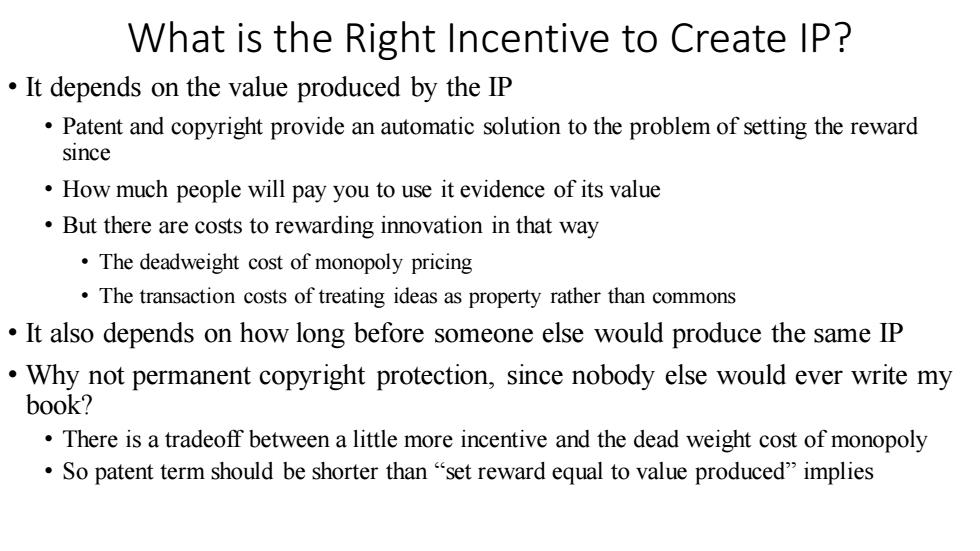
What is the Right Incentive to Create IP? It depends on the value produced by the IP Patent and copyright provide an automatic solution to the problem of setting the reward since How much people will pay you to use it evidence of its value But there are costs to rewarding innovation in that way The deadweight cost of monopoly pricing The transaction costs of treating ideas as property rather than commons It also depends on how long before someone else would produce the same IP Why not permanent copyright protection,since nobody else would ever write my book? There is a tradeoff between a little more incentive and the dead weight cost of monopoly So patent term should be shorter than"set reward equal to value produced"implies
What is the Right Incentive to Create IP? • It depends on the value produced by the IP • Patent and copyright provide an automatic solution to the problem of setting the reward since • How much people will pay you to use it evidence of its value • But there are costs to rewarding innovation in that way • The deadweight cost of monopoly pricing • The transaction costs of treating ideas as property rather than commons • It also depends on how long before someone else would produce the same IP • Why not permanent copyright protection, since nobody else would ever write my book? • There is a tradeoff between a little more incentive and the dead weight cost of monopoly • So patent term should be shorter than “set reward equal to value produced” implies
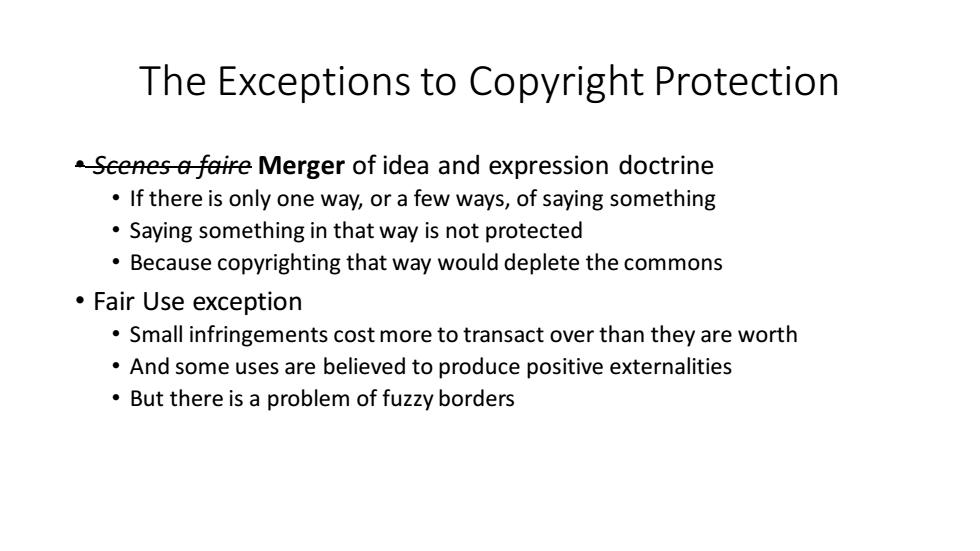
The Exceptions to Copyright Protection .Scenes a faire Merger of idea and expression doctrine If there is only one way,or a few ways,of saying something Saying something in that way is not protected Because copyrighting that way would deplete the commons ·Fair Use exception Small infringements cost more to transact over than they are worth And some uses are believed to produce positive externalities But there is a problem of fuzzy borders
The Exceptions to Copyright Protection • Scenes a faire Merger of idea and expression doctrine • If there is only one way, or a few ways, of saying something • Saying something in that way is not protected • Because copyrighting that way would deplete the commons • Fair Use exception • Small infringements cost more to transact over than they are worth • And some uses are believed to produce positive externalities • But there is a problem of fuzzy borders
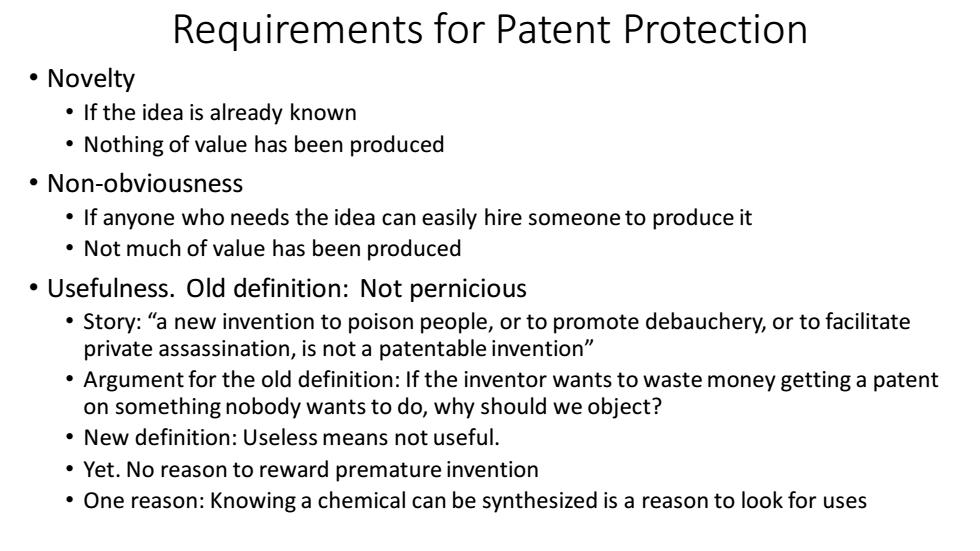
Requirements for Patent Protection ·Novelty If the idea is already known Nothing of value has been produced 。Non-obviousness If anyone who needs the idea can easily hire someone to produce it Not much of value has been produced Usefulness.Old definition:Not pernicious Story:"a new invention to poison people,or to promote debauchery,or to facilitate private assassination,is not a patentable invention" Argument for the old definition:If the inventor wants to waste money getting a patent on something nobody wants to do,why should we object? New definition:Useless means not useful. Yet.No reason to reward premature invention One reason:Knowing a chemical can be synthesized is a reason to look for uses
Requirements for Patent Protection • Novelty • If the idea is already known • Nothing of value has been produced • Non-obviousness • If anyone who needs the idea can easily hire someone to produce it • Not much of value has been produced • Usefulness. Old definition: Not pernicious • Story: “a new invention to poison people, or to promote debauchery, or to facilitate private assassination, is not a patentable invention” • Argument for the old definition: If the inventor wants to waste money getting a patent on something nobody wants to do, why should we object? • New definition: Useless means not useful. • Yet. No reason to reward premature invention • One reason: Knowing a chemical can be synthesized is a reason to look for uses
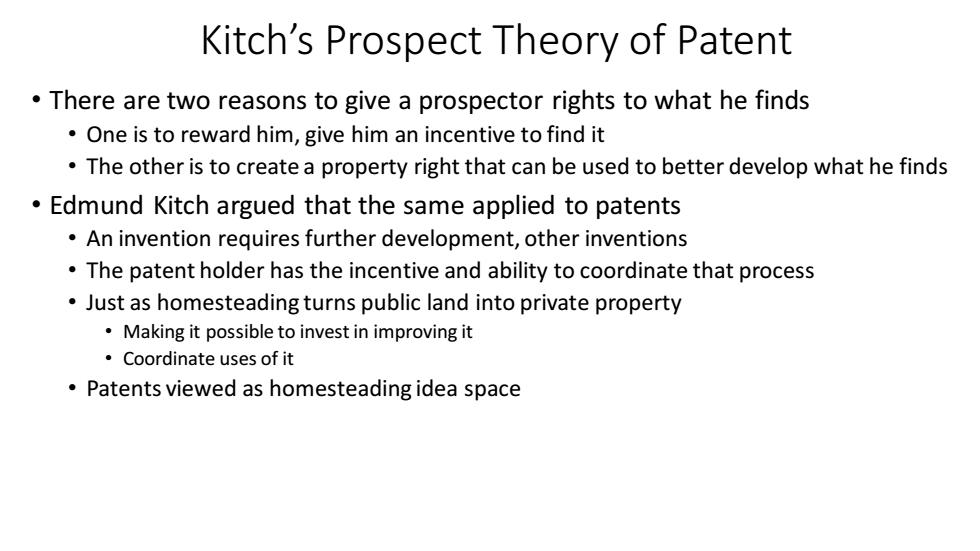
Kitch's Prospect Theory of Patent There are two reasons to give a prospector rights to what he finds One is to reward him,give him an incentive to find it The other is to create a property right that can be used to better develop what he finds Edmund Kitch argued that the same applied to patents An invention requires further development,other inventions The patent holder has the incentive and ability to coordinate that process Just as homesteading turns public land into private property Making it possible to invest in improving it ·Coordinate uses of it Patents viewed as homesteading idea space
Kitch’s Prospect Theory of Patent • There are two reasons to give a prospector rights to what he finds • One is to reward him, give him an incentive to find it • The other is to create a property right that can be used to better develop what he finds • Edmund Kitch argued that the same applied to patents • An invention requires further development, other inventions • The patent holder has the incentive and ability to coordinate that process • Just as homesteading turns public land into private property • Making it possible to invest in improving it • Coordinate uses of it • Patents viewed as homesteading idea space
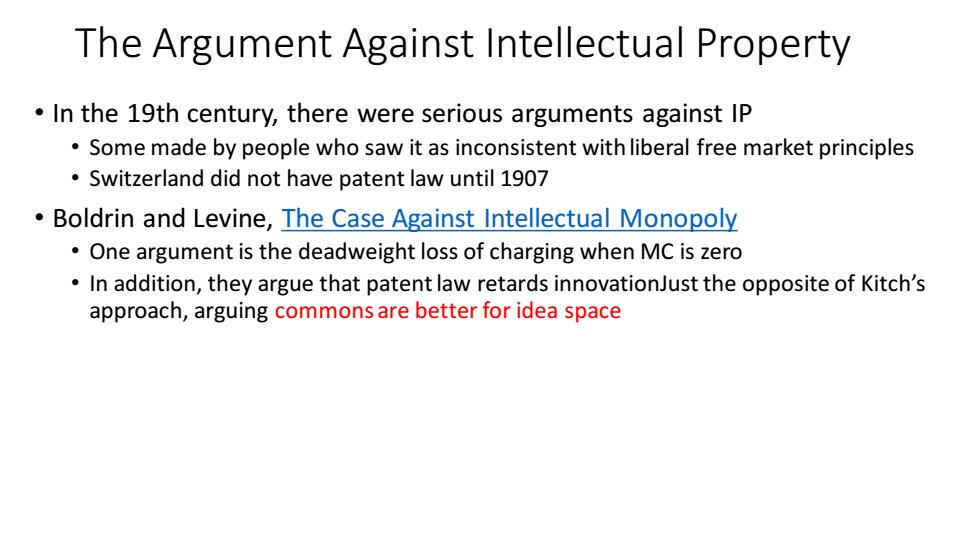
The Argument Against Intellectual Property In the 19th century,there were serious arguments against IP Some made by people who saw it as inconsistent with liberal free market principles Switzerland did not have patent law until 1907 Boldrin and Levine,The Case Against Intellectual Monopoly One argument is the deadweight loss of charging when MC is zero In addition,they argue that patent law retards innovationJust the opposite of Kitch's approach,arguing commons are better for idea space
The Argument Against Intellectual Property • In the 19th century, there were serious arguments against IP • Some made by people who saw it as inconsistent with liberal free market principles • Switzerland did not have patent law until 1907 • Boldrin and Levine, The Case Against Intellectual Monopoly • One argument is the deadweight loss of charging when MC is zero • In addition, they argue that patent law retards innovationJust the opposite of Kitch’s approach, arguing commons are better for idea space
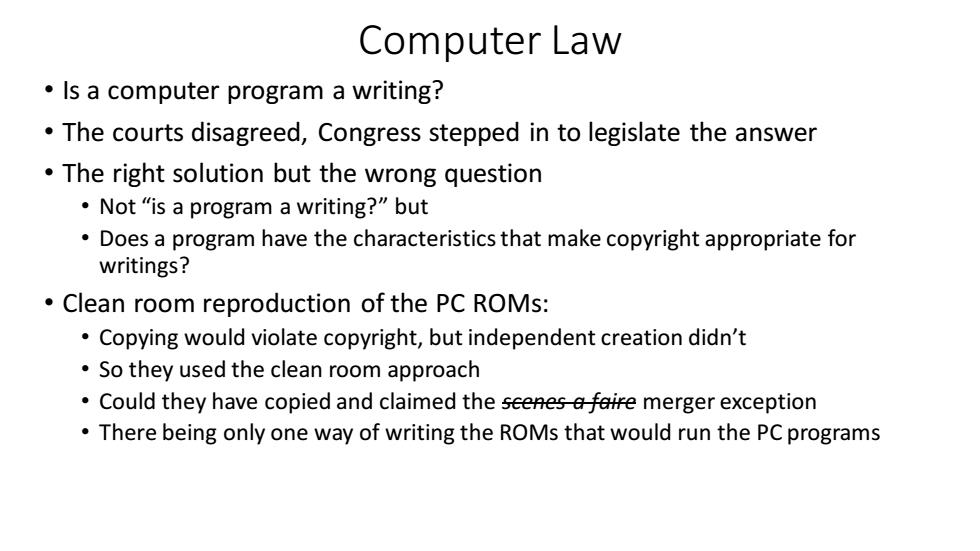
Computer Law Is a computer program a writing? The courts disagreed,Congress stepped in to legislate the answer The right solution but the wrong question ·Not“is a program a writing?"but Does a program have the characteristics that make copyright appropriate for writings? Clean room reproduction of the PC ROMs: Copying would violate copyright,but independent creation didn't So they used the clean room approach Could they have copied and claimed the scenes a faire merger exception There being only one way of writing the ROMs that would run the PC programs
Computer Law • Is a computer program a writing? • The courts disagreed, Congress stepped in to legislate the answer • The right solution but the wrong question • Not “is a program a writing?” but • Does a program have the characteristics that make copyright appropriate for writings? • Clean room reproduction of the PC ROMs: • Copying would violate copyright, but independent creation didn’t • So they used the clean room approach • Could they have copied and claimed the scenes a faire merger exception • There being only one way of writing the ROMs that would run the PC programs
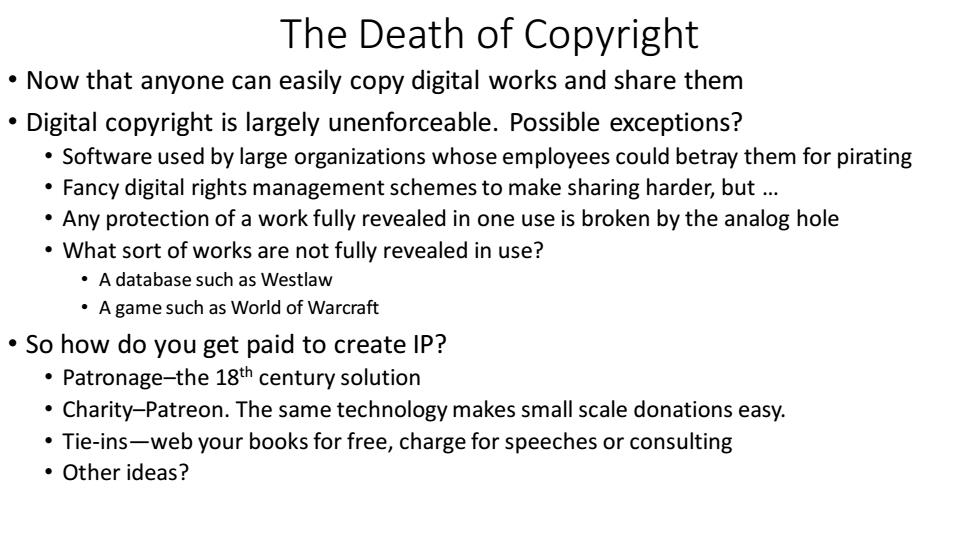
The Death of Copyright Now that anyone can easily copy digital works and share them Digital copyright is largely unenforceable.Possible exceptions? Software used by large organizations whose employees could betray them for pirating Fancy digital rights management schemes to make sharing harder,but .. Any protection of a work fully revealed in one use is broken by the analog hole What sort of works are not fully revealed in use? A database such as Westlaw A game such as World of Warcraft So how do you get paid to create IP? Patronage-the 18th century solution Charity-Patreon.The same technology makes small scale donations easy. Tie-ins-web your books for free,charge for speeches or consulting ·Other ideas?
The Death of Copyright • Now that anyone can easily copy digital works and share them • Digital copyright is largely unenforceable. Possible exceptions? • Software used by large organizations whose employees could betray them for pirating • Fancy digital rights management schemes to make sharing harder, but … • Any protection of a work fully revealed in one use is broken by the analog hole • What sort of works are not fully revealed in use? • A database such as Westlaw • A game such as World of Warcraft • So how do you get paid to create IP? • Patronage–the 18th century solution • Charity–Patreon. The same technology makes small scale donations easy. • Tie-ins—web your books for free, charge for speeches or consulting • Other ideas?
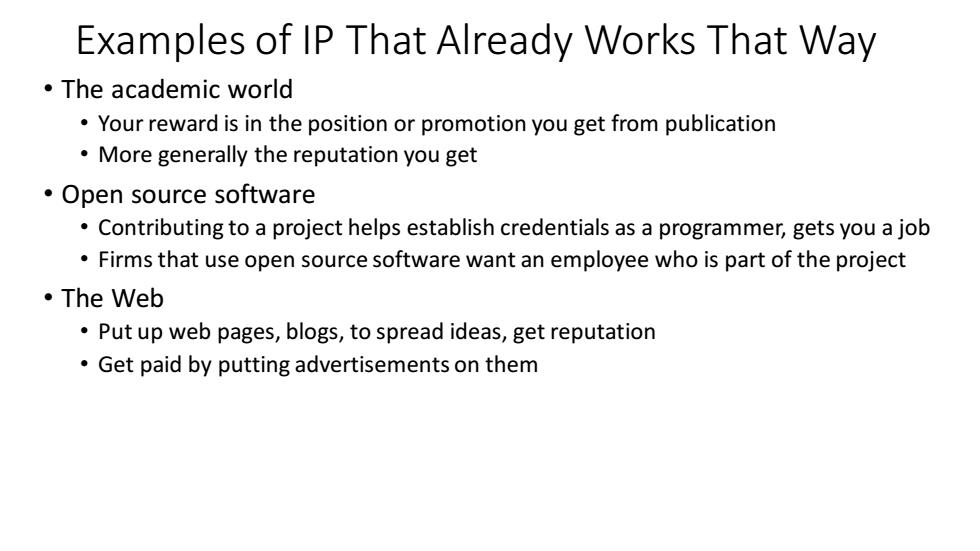
Examples of IP That Already Works That Way ·The academic world Your reward is in the position or promotion you get from publication More generally the reputation you get ·Open source software Contributing to a project helps establish credentials as a programmer,gets you a job Firms that use open source software want an employee who is part of the project ·The Web Put up web pages,blogs,to spread ideas,get reputation Get paid by putting advertisements on them
Examples of IP That Already Works That Way • The academic world • Your reward is in the position or promotion you get from publication • More generally the reputation you get • Open source software • Contributing to a project helps establish credentials as a programmer, gets you a job • Firms that use open source software want an employee who is part of the project • The Web • Put up web pages, blogs, to spread ideas, get reputation • Get paid by putting advertisements on them